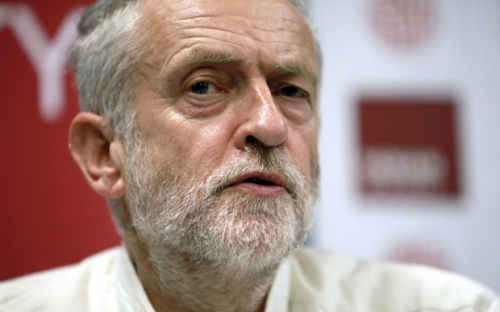Labour’s defeat in the 2015 election may have been as much of a function of demographics as anything much else. As I wrote earlier this week: “Britain is greying, and older people tend to be more conservative.” If that’s the case, then the deck will be stacked against Labour in 2020, and even more so after constituency boundary changes that will help the Tories and hurt Labour. Still, the question that Labour members and supporters should be asking themselves is: which one of the candidates can beat the Tories in 2020? As a political movement, only in power can you wield power. In opposition, you — and your supporters — are the earth in front of the steamroller of power. That’s not necessarily a call to reject Jeremy Corbyn, though. There are legitimate reasons to think that he might be the best choice on these terms. My doubts about Corbyn begin with his portrayal as overly leftish. If Ed Miliband was perceived as too left wing for the British electorate in 2015, why would Corbyn — who is a good few swathes of territory to the left of Miliband — be right for an even greyer and more conservative Britain in 2020? A second factor is that Corbyn is already on the defensive over alleged associations with anti-Semitic figures.
Topics:
John Aziz considers the following as important: andy burnham, Current Affairs, jeremy corbyn, Musings, yvette cooper
This could be interesting, too:
Mike Norman writes Craig Murray — A Moment in History
Mike Norman writes The Saker Interviews Dmitry Orlov
Mike Norman writes Richard Murphy — The New Statesman: making up stories about modern monetary theory
Mike Norman writes Ramanan — Fine Jeremy Corbyn Speech From 2010
Labour’s defeat in the 2015 election may have been as much of a function of demographics as anything much else. As I wrote earlier this week: “Britain is greying, and older people tend to be more conservative.”
If that’s the case, then the deck will be stacked against Labour in 2020, and even more so after constituency boundary changes that will help the Tories and hurt Labour.
Still, the question that Labour members and supporters should be asking themselves is: which one of the candidates can beat the Tories in 2020?
As a political movement, only in power can you wield power. In opposition, you — and your supporters — are the earth in front of the steamroller of power.
That’s not necessarily a call to reject Jeremy Corbyn, though. There are legitimate reasons to think that he might be the best choice on these terms.
My doubts about Corbyn begin with his portrayal as overly leftish. If Ed Miliband was perceived as too left wing for the British electorate in 2015, why would Corbyn — who is a good few swathes of territory to the left of Miliband — be right for an even greyer and more conservative Britain in 2020?
A second factor is that Corbyn is already on the defensive over alleged associations with anti-Semitic figures. I’m not in any way suggesting Corbyn is an anti-Semite — or wilfully associated with anti-Semites — but the tone of the conversation makes it look like a troubling factor in winning a general election against a hostile Tory press.
Furthermore, his conciliatory language toward such groups as Hezbollah, Hamas, Maduro’s Venezuela and Vladimir Putin’s Russia offers even more ammunition for the Tory press to use against him to portray as a dangerous choice for prime minister, just as they did to Ed Miliband. And that is the case even if his words were meant to open dialogue rather than endorse a particular set of views or policies.
And further, it would seem to split the Labour parliamentary bloc. The Tory press will ask the question: how can we expect him to lead the country when he can’t even lead his own party?
Still, it is hard to ignore what Corbyn has stirred up in the leadership battle. It looks increasingly like what the SNP has managed to stir up in Scotland. Hundreds of thousands flocking to register as supporters. A genuinely optimistic alternative vision of the future. As George Monbiot writes in The Guardian: “Labour’s inability to provide a loud and proud alternative to Conservative policies explains why so much of its base switched to Ukip at the last election. Corbyn’s political clarity explains why the same people are flocking back to him.”
Monbiot quotes openDemocracy‘s Ian Sinclair comparing Corbyn to Margaret Thatcher, noting she was: “Divisive, hated by the press, seen by her own party as an extremist… [and] widely dismissed as unelectable. The Tory establishment, convinced that the party could win only from the centre, did everything it could to stop her.”
Corbyn is a conviction politician like Thatcher, with a vision of radical change. Corbyn’s leadership election opponents aren’t. They tend to advocate chasing after the electorate. That is not necessarily a stupid thing to do. It worked to get Blair and Cameron elected. But times change. Chasing after the electorate — and reinforcing Tory myths about the necessity of slashing the deficit, reducing immigration and reducing public spending — didn’t work in 2015 for Labour. It just helped the Tories portray Labour as incompetent on their own terms. Corbyn won’t re-inforce deficitphobe myths. He is a principled anti-austerian in a field that otherwise concedes the narrative almost entirely to the Tories. And his economic views have a good deal of credibility and support from economists.
In the end, I chose not to back Corbyn as Labour leader. It just looks to me like too much of an uphill struggle to win in 2020 — or earlier should Cameron’s majority of twelve fall — from Corbyn’s position. But I might be wrong. And I will be happy to see him elected Labour leader and given a chance to change the narrative.

